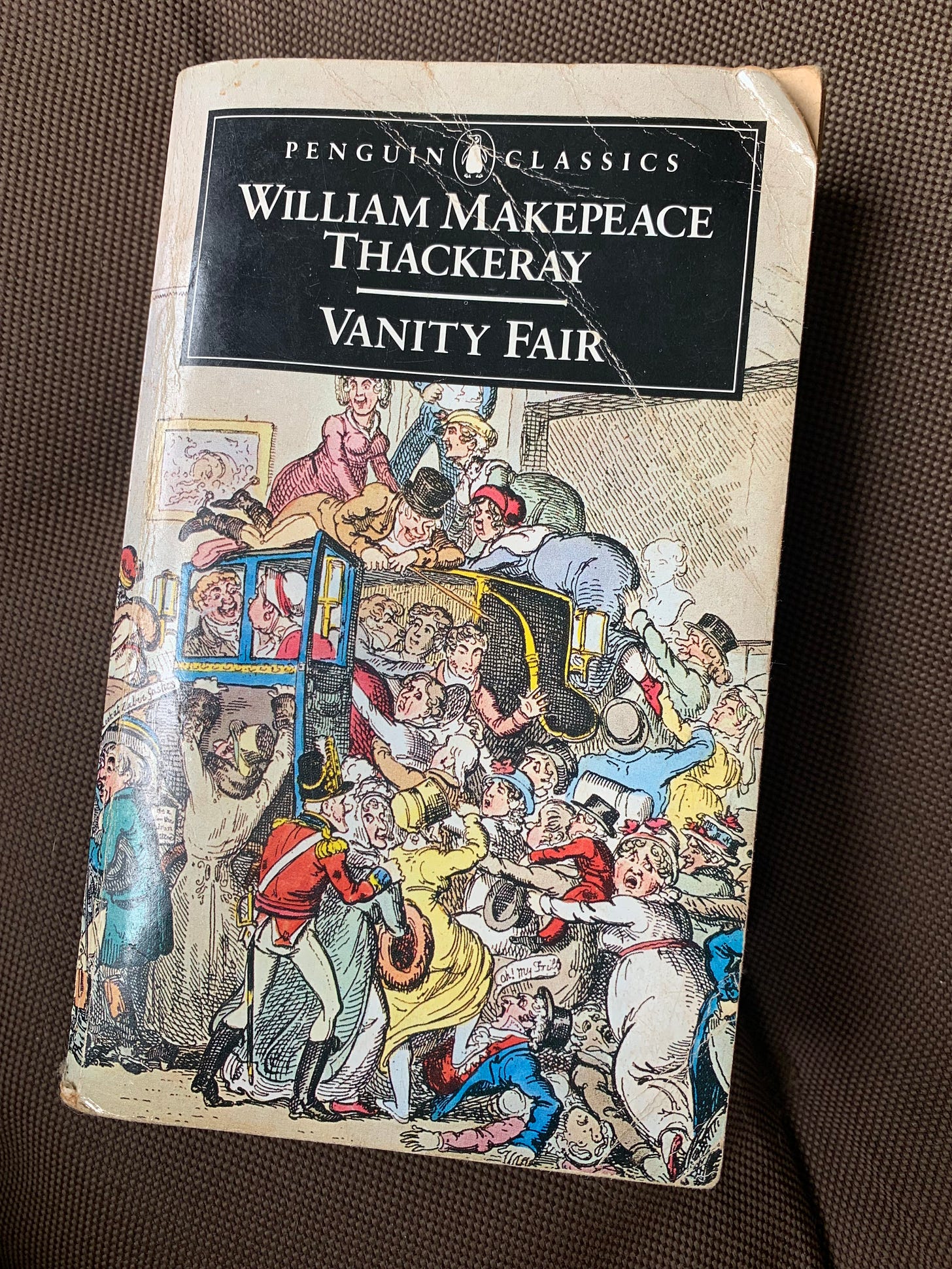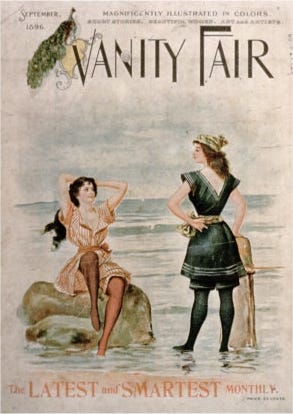
“Vanity of vanities! All is vanity!” So says the Preacher in Ecclesiastes 1:2 and thus inspires Bunyan to dream up one of the most vivid and terrifying portrayals of human vanity in all of literature: Vanity Fair. It is a place where all that is empty, fruitless, and vain is not merely attainable, but is marketed, sold, and consumed with fervor.
Bunyan’s description of its offerings is downright feverish:
[It is] a fair wherein, should be sold all sorts of vanity, and that it should last all the year long: therefore at this fair are all such merchandise sold, as houses, lands, trades, places, honours, preferments, titles, countries, kingdoms, lusts, pleasures, and delights of all sorts, as whores, bawds, wives, husbands, children, masters, servants, lives, blood, bodies, souls, silver, gold, pearls, precious stones, and what not.
And, moreover, at this fair there is at all times to be seen juggling cheats, games, plays, fools, apes, knaves, and rogues, and that of every kind.
Here are to be seen, too, and that for nothing, thefts, murders, adulteries, false swearers, and that of a blood-red colour.
Bunyan uses language to provide the sense of being overwhelmed by unlimited temptations and tempters.
This place has captured the human imagination ever since. William Thackeray named his 1848 novel Vanity Fair for it. The high fashion magazine takes its name from the same image. There are likely many more cultural references I’m not remembering right now. (Drop them in the comments!) But it is significant that the image has moved from Bunyan’s condemnation of such a place as wicked and cruel to an image that is celebrated as a hedonistic lifestyle. Significant indeed.
One of the things that always strikes me in reading this passage is how insightful Bunyan is in portraying not only the immorality of Vanity Fair, but also its cruelty. I think our modern understanding of sin tends to emphasize how alluring it can be on the surface and how hard it can be to resist. But Bunyan does something a little different here that I think is brilliant. He brings forth how vicious and cruel a life of vanity is and, furthermore, how once you are caught up with those who are caught up in it, they will not willingly or easily give you up. The way Bunyan depicts this is terrorizing. At least it is to me on this reading, and I think that’s because I’ve seen a little bit more about how very cruel vanity is in recent days.
Let’s look at how Bunyan shows this in the text and then at how we can see Bunyan’s truth at play in the world today.
First, as they walk through the Fair, Christian and Faithful cause a hubbub simply by existing. They immediately appear different to the fairgoers because of their clothing and their speech. But then they commit the more serious offense by not buying the merchandise that Vanity Fair is selling. When asked why, they reply honestly: “We buy the Truth.”
Then all hell breaks loose.
Christian and Faithful are seized, beaten, “besmeared” with dirt, and placed in a cage to be put on display and mocked. In response they offer blessings, “good words for bad, and kindness of injuries done.”
They are put on trial, charged with being enemies of the fair’s trade, of being “divisive” (sound familiar?) and, of course, of being in contempt of “their Prince” (none other than Beelzebub). The witnesses called are Envy, Superstition, and Pick-thank (which means something like a flatterer who picks the ones he wants to kiss up to). The jurors called to try Faithful constitute another stroke of Bunyan’s brilliance: “Mr. Blind-man, Mr. No-good, Mr. Malice, Mr. Love-lust, Mr. Live-loose, Mr. Heady, Mr. High-mind, Mr. Enmity, Mr. Liar, Mr. Cruelty, Mr. Hate-light, and Mr. Implacable.” Here’s the thing about this I love the most. Notice in what follows how each juror acts in accordance with his name or character (I’ve added the appropriate emphases):
And first, among themselves, Mr. Blind-man, the foreman, said, I see clearly that this man is a heretic. Then said Mr. No-good, Away with such a fellow from the earth. Ay, said Mr. Malice, for I hate the very looks of him. Then said Mr. Love-lust, I could never endure him. Nor I, said Mr. Live-loose, for he would always be condemning my way. Hang him, hang him, said Mr. Heady. A sorry scrub, said Mr. High-mind. My heart riseth against him, said Mr. Enmity. He is a rogue, said Mr. Liar. Hanging is too good for him, said Mr. Cruelty. Let us despatch him out of the way, said Mr. Hate-light. Then said Mr. Implacable, Might I have all the world given me, I could not be reconciled to him; therefore, let us forthwith bring him in guilty of death.
The jury convicts and condemns Faithful to be “put to the most cruel death that could be invented.” Bunyan spares no details in telling us about Faithful’s tortured death. It is horrifying.
And with this I want to return to an aspect of this entire saga that I skipped over. It struck me with new import in this re-reading and I want to dwell on it a bit. It occurs earlier in this stint in Vanity Fair, right after Christian and Faithful were placed in cages.
While some were mocking and torturing the two, some others at the Fair who “were more observing, and less prejudiced, than the rest, began to check and blame the baser sort for their continual abuses.” And what was the crowd’s response to these more reasonable folks? They became angry at them, “counting them as bad as the men in the cage, and telling them that they seemed confederates, and should be made partakers of their misfortunes.” The more reasonable men pleaded with their fellows that Christian and Faithful “were quiet, and sober, and intended nobody any harm,” and that there were far worse “more worthy to be put in the Cage.” But to no avail.
These two factions within Vanity Fair “fell to some blows, among themselves, and did harm one to another.” It was then that they turned even more viciously on Christian and Faithful in order to make an example of them and terrorize everyone else, “lest any further should speak in their behalf, or join themselves unto” Christian and Faithful.
Folks, I cannot tell you how close this hits to home. And that had never happened for me in my previous readings of this text. But between that last time (just a few years ago when I last taught The Pilgrim’s Progress) and now, I have learned about something called “the law of group polarization” and how this phenomenon results in the demonization of “in-group moderates.”
Now, having no expertise in political science or sociology, I’m going to try to explain what I understand about these terms through what I experienced. I didn’t understand this was what was happening, but others who have expertise in these phenomena explained it to me, and all of a sudden a lot of things began to make sense.
I had an in-group. For all of my adult life it was a politically and theologically conservative social, professional, and church community. I have held basically the same convictions and views in all these arenas for decades. My views were at times a bit more nuanced than some within my group, perhaps, and my posture often was different towards those outside the group simply because of how and where I was raised. And I was understood and accepted by my in-group--until the law of group polarization really began to take hold over the past few years (for many reasons beyond what I can explain here, but one surely is the effect of social media amplification).
As things began to polarize at a dizzying rate, I began to be attacked by those in my in-group more than they seemed to be attacking those outside it. It was bewildering and disorienting. But, as others explained to me as the dust began to settle, when power accrues through polarization, the greatest enemy of the group becomes not those outside it, but the reasonable voices of moderation inside it. Those voices must be expelled.
And I was (as those of you following along here know).
To return to another parallel in this part of the story of Vanity Fair, if any of you are following anything that is happening in politics or you are on social media at all, you know that we see the same thing happening here as there: in-groups further fracturing and polarizing as the members turn on each other and continue to fight each other almost to the death.
It is Vanity Fair all over again. And it is in the church.
And so I found this particular part of The Pilgrim’s Progress in this particular re-reading the most terrifying. And the most haunting.
I thank God that I know how the story ends.
***
I try not to appeal for your support often, but from time to time, I want to remind you that it is my earnest desire to make my content free for anyone. You can support me simply by subscribing for free and by sharing my work. Please do these things if you feel so led! If you are able to provide further support by becoming a paid subscriber, you can support this work even more. I thank you for considering it. And thank you to the new subscribers who have come alongside. I know that there are so many good writers and publications out there—and such little time. I never take for granted that you are here and that you make The Priory possible. Thank you.
Reading schedule for The Pilgrim’s Progress—note I’m describing the sections since there are no chapters:
April 29: Intro to the work and discussion of “The Author’s Apology for his Book”
May 6: Beginning to introduction of Simple, Sloth, and Presumption
May 13: Introduction of Simple, Sloth, and Presumption to introduction of Talkative
May 20: Introduction of Talkative to the By-Path Meadow
May 27: By-Path Meadow to introduction of the Atheist
June 3: From the Atheist to the end
June 10: Guest post by
on Bunyan’s influence on Black writers (this is going to be good)
You can read the work online here. Stay tuned for the reading schedule for Part 2. We’ll go about the same pace we are here, but may have a break in between for a week or two.
Finally, I will have an update and offer regarding my new book, You Have a Calling, very soon. Stay tuned!
"Absolutely unmixed attention is prayer.” – Simone Weil1
Simone Weil, Gravity and Grace, trans. By Emma Crawford and Mario von der Ruhr (London: Routledge, 2002), 117.






I was so struck by Talkative's desire to talk theology until its application became the topic. Then he is no longer interested. I had so much poor (random really) theology to correct in my earlier years that I saw being right about doctrine as a measure of spiritual life and growth. Bunyan has seen it all. He's living in the middle of the biggest theological debate ever and recognizes that a person can talk theology beautifully but if their life is inconsistent with the character of Christ, they are very poor companions on the pilgrimage.
I love the hopeful (oops!) note that Bunyan strikes, "This Hopeful also told Christian, that there were many more of the men in the Fair that would take their time, and follow after." More of "the reasonable voices of moderation" one presumes, but perhaps even some of those most violently opposed. We can but pray so.